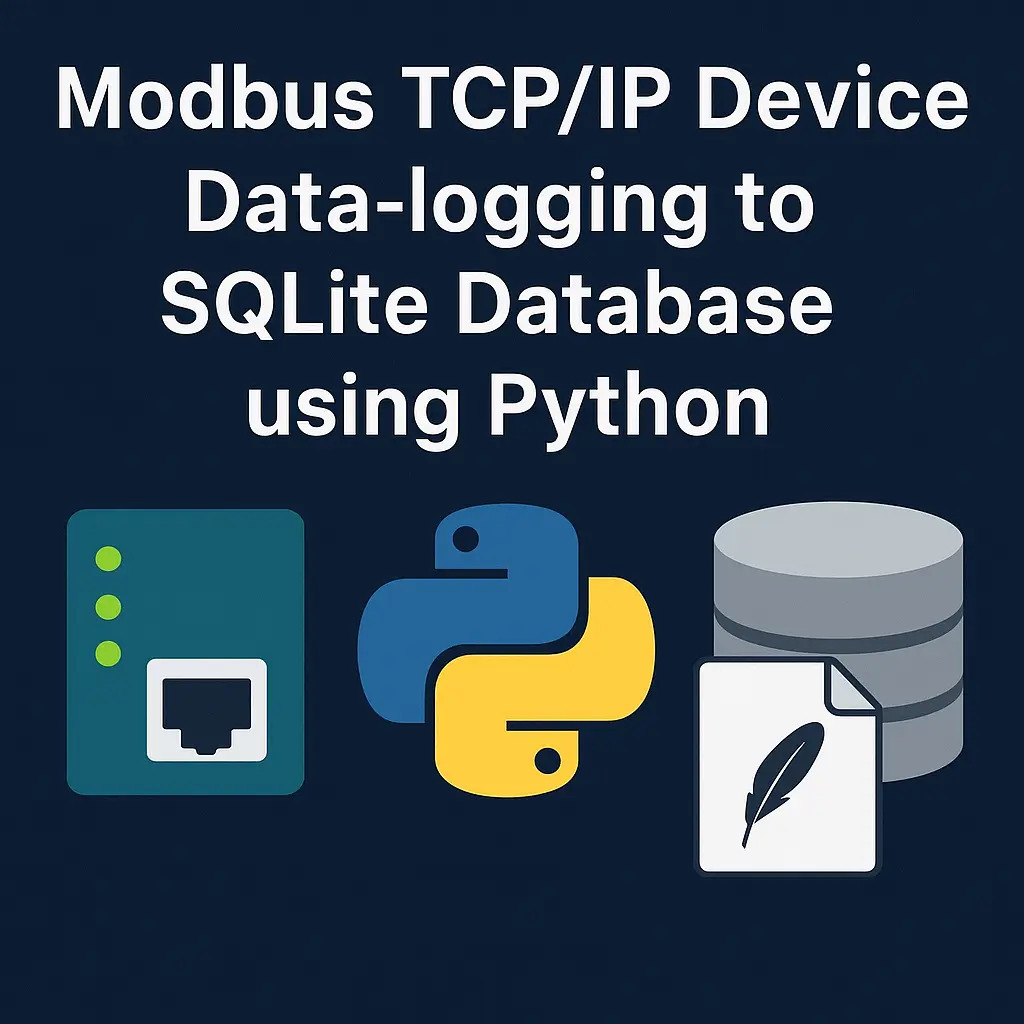
Modbus TCP/IP Device Data-logging to SQLite Database using Python
Last Code Revision Date: 02-Sep-2025
Modbus TCP/IP to SQLite Datalogger
This project logs Modbus TCP/IP device data into an SQLite database for historical storage and analysis. It uses pymodbus for Modbus communication and Python’s built-in sqlite3 for database operations.
Library Version Details
| Package | Version | Description |
|---|---|---|
| pymodbus | 3.11.1 | Modbus protocol implementation |
| sqlite3 | builtin | SQLite database for Python |
Features
- Reads Modbus holding registers (default; other types supported)
- Per-address reading for flexibility (supports non-consecutive addresses)
- Logs only when values change
- Each register/address is logged with timestamp, type, address, and value
- Configurable update interval
- Easy configuration via
src/config.py
Project Structure
modbus-sqlite-datalogger-02092025
├── src
│ ├── main.py # Main application logic
│ ├── modbus_client.py # Modbus TCP client wrapper
│ ├── sqlite_logger.py # SQLite logger for Modbus data
│ ├── modbus_data.db # SQLite database file (created at runtime)
│ └── config.py # User configuration for Modbus/database/interval
├── requirements.txt # Python dependencies
├── README.md # Project documentation
Installation
- Clone the repository:
git clone <repository-url> cd modbus-sqlite-datalogger-02092025
- Install dependencies:
powershell or CMD
pip install -r requirements.txt
Configuration
Edit src/config.py to set:
- Modbus server IP and port
- Modbus slave ID (unit)
- SQLite database filename
- Register types and addresses to read (currently only holding registers enabled)
- Update interval (in seconds)
Example (src/config.py):
SQLITE_DB_NAME = 'modbus_data.db'
MODBUS_SERVER = '127.0.0.1'
MODBUS_PORT = 502
MODBUS_SLAVE_ID = 1
MODBUS_READ_CONFIG = {
"holding_registers": {
"addresses": [0, 1, 2, 5, 6, 7]
}
# "coils": {"addresses": [0, 1, 2]},
# "discrete_inputs": {"addresses": [0, 1, 2]},
# "input_registers": {"addresses": [0, 1, 2]},
}
UPDATE_INTERVAL = 5 # seconds
To enable other data types (coils, discrete inputs, input registers), uncomment and configure them in MODBUS_READ_CONFIG.
Usage
Start the datalogger:
powershell or CMD
python src/main.py
- The app reads configured Modbus addresses at the set interval.
- Only changed values are logged to the SQLite database.
- Each value is stored with timestamp, type, address, and value.
Testing & Validation
- Ensure your Modbus server is running and accessible.
- Use any SQLite client or tool to inspect the
modbus_data.dbdatabase. - Change Modbus register values to see new rows logged in the database.
Advanced
- Supports all Modbus data types (add to
MODBUS_READ_CONFIGas needed). - Easily extend for batch reads, custom logging, or data export.
33.87$
SKU
50
Categories Modbus + Python, Python
Pages
- Home
- About
- Products
- Training
- Blogs
- Contact Us

